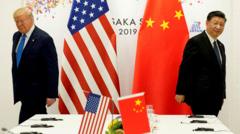In a recent development, the global financial markets experienced a significant downturn following President Donald Trump's declaration of new tariffs, leading to a 4.8% plunge in the S&P 500—the largest since the onset of the COVID-19 pandemic in 2020. The announcement, which includes a minimum 10% levy on imports, especially impacts major consumer brands such as Nike, Apple, and Target, all of which saw declines of over 9%. President Trump remains optimistic about the economy's future, asserting that the tariffs will boost federal revenue and restore American manufacturing.
Trump's Tariffs Spark Major Market Decline as Global Retaliation Looms

Trump's Tariffs Spark Major Market Decline as Global Retaliation Looms
The announcement of sweeping tariffs by President Trump has triggered the most significant drop in US stock markets since 2020, prompting international concerns and potential retaliatory measures from major trading partners.
However, both China and the European Union have announced plans to retaliate, facing tariffs as high as 54% and 20% respectively. The World Trade Organization raised alarms about a potential contraction in global trade volumes, predicting a 1% shrinkage this year due to these levies. The financial fallout has already seen approximately $2 trillion wiped from the S&P 500's market value, coupled with significant drops in other major indices, including the Dow Jones and the Nasdaq.
Stock market volatility has also heightened demand for gold, a traditional safe haven during economic turbulence, while the dollar has weakened against other currencies. Analysts caution that the tariffs could negatively impact US and European economic growth, with fears of a potential recession looming. In response to the tariffs, companies are grappling with the decision to absorb costs or transfer them to consumers, which may further affect global economic stability.
As the situation develops, companies like Stellantis have begun halting production in North America, signaling the immediate implications of Trump’s trade policies. The ripple effects of these tariffs predict further market instability as firms adjust to the new economic landscape.
With the financial community bracing for more turbulence and potential retaliation from affected countries, experts emphasize that Trump's trade strategy could alter the global trading order established over the last century, leaving many questions unanswered about the path ahead in American and global markets.
Stock market volatility has also heightened demand for gold, a traditional safe haven during economic turbulence, while the dollar has weakened against other currencies. Analysts caution that the tariffs could negatively impact US and European economic growth, with fears of a potential recession looming. In response to the tariffs, companies are grappling with the decision to absorb costs or transfer them to consumers, which may further affect global economic stability.
As the situation develops, companies like Stellantis have begun halting production in North America, signaling the immediate implications of Trump’s trade policies. The ripple effects of these tariffs predict further market instability as firms adjust to the new economic landscape.
With the financial community bracing for more turbulence and potential retaliation from affected countries, experts emphasize that Trump's trade strategy could alter the global trading order established over the last century, leaving many questions unanswered about the path ahead in American and global markets.






















